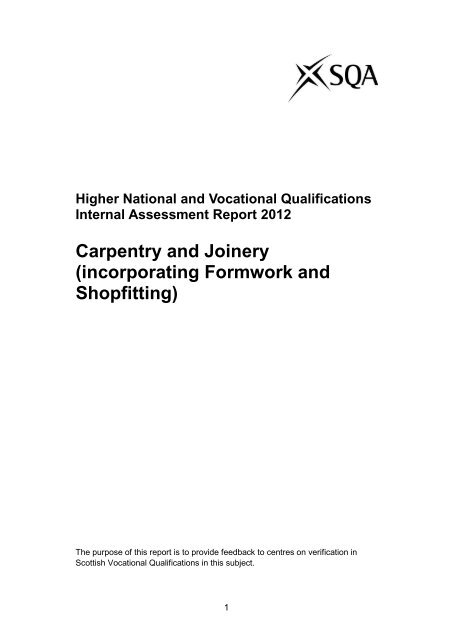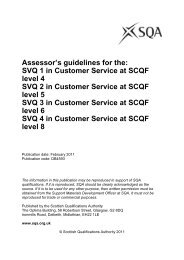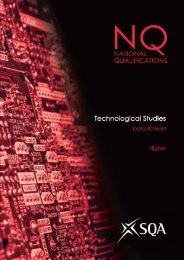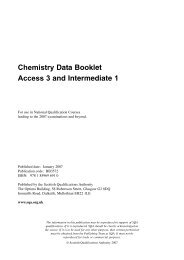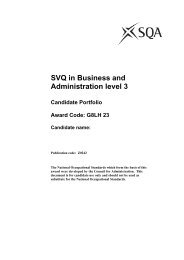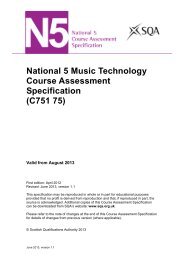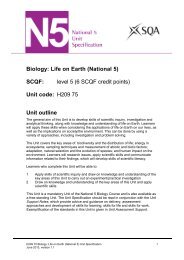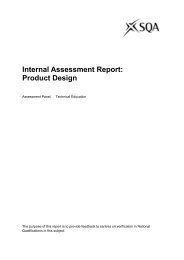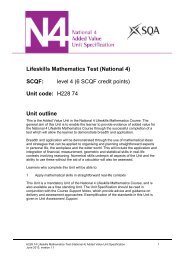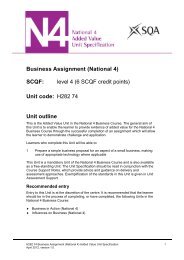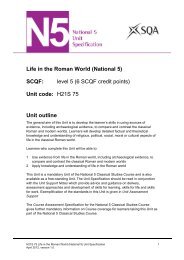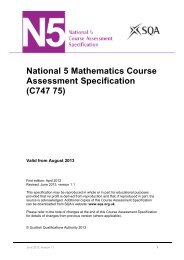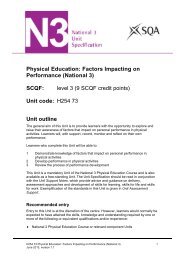Carpentry and Joinery - Scottish Qualifications Authority
Carpentry and Joinery - Scottish Qualifications Authority
Carpentry and Joinery - Scottish Qualifications Authority
Create successful ePaper yourself
Turn your PDF publications into a flip-book with our unique Google optimized e-Paper software.
Higher National <strong>and</strong> Vocational <strong>Qualifications</strong><br />
Internal Assessment Report 2012<br />
<strong>Carpentry</strong> <strong>and</strong> <strong>Joinery</strong><br />
(incorporating Formwork <strong>and</strong><br />
Shopfitting)<br />
The purpose of this report is to provide feedback to centres on verification in<br />
<strong>Scottish</strong> Vocational <strong>Qualifications</strong> in this subject.<br />
1
SVQ awards<br />
General comments<br />
All of the centres visited for the SVQ Level 3 <strong>Carpentry</strong> <strong>and</strong> <strong>Joinery</strong> award had a<br />
clear <strong>and</strong> accurate underst<strong>and</strong>ing of the requirements of the national st<strong>and</strong>ards.<br />
Unfortunately the one centre which offered the SVQ Level 3 Shopfitting had no<br />
c<strong>and</strong>idates registered this session, which is a reflection of the current economic<br />
climate in the construction industry. However, the centres offering the <strong>Carpentry</strong><br />
<strong>and</strong> <strong>Joinery</strong> award were all using the most current version of the nationallydevised<br />
assessment instruments <strong>and</strong> Unit specifications effectively (TAP <strong>and</strong><br />
PDA Level 6).<br />
Centre staff were recording c<strong>and</strong>idates’ achievements by means of an individual<br />
portfolio system, as well as appropriate documentation to support the process.<br />
There were instances in a few centres of c<strong>and</strong>idates’ signatures missing from<br />
portfolios at the time of EV visits; however, this was easily rectified by centre staff<br />
<strong>and</strong> c<strong>and</strong>idates. The portfolio system dovetailed with Construction Skills<br />
recording/reporting mechanisms <strong>and</strong> was proving, in the main, to be very<br />
effective.<br />
Discussions with assessors <strong>and</strong> Internal Verifiers confirmed that centres were<br />
very conversant with the requirements of the award, <strong>and</strong> any development points<br />
noted were more about fine tuning as opposed to a significant lack of knowledge.<br />
Comments from the EVs regarding the quality of the work presented for sampling<br />
also confirmed that centres were almost all fully conversant with the requirements<br />
of the award. It was pleasing to note that the st<strong>and</strong>ard of work presented has<br />
improved overall, ranging from good to exceptional.<br />
It is also encouraging to note that centres have acknowledged the importance of<br />
concentrating on the quality of the finish of the practical work in the early stages<br />
of the award. The need to fully develop c<strong>and</strong>idates’ skills at this stage is critical,<br />
as it prepares c<strong>and</strong>idates for the more dem<strong>and</strong>ing criteria at later stages in the<br />
Course.<br />
An essential part of this process, which has been highlighted in almost all the<br />
reports, is the need for timely <strong>and</strong> constructive feedback to be given to<br />
c<strong>and</strong>idates. This allows the assessor to set st<strong>and</strong>ards early on in the formative<br />
assessment process, <strong>and</strong> will undoubtedly help c<strong>and</strong>idates achieve the required<br />
summative st<strong>and</strong>ards.<br />
Unit specifications, instruments of assessment <strong>and</strong><br />
exemplification materials<br />
Of the centres visited, all the assessment teams were familiar with the Course<br />
structure <strong>and</strong> documentation. Centre staff are much clearer on the requirements<br />
of the TAP Unit 1 covering the Scaffolding Appreciation <strong>and</strong> this is operating well.<br />
2
The revised approach to meeting the requirements for scaffolding within the<br />
award has removed some considerable burden from centres in terms of staff<br />
qualifications requirements <strong>and</strong> also resources. It is seen by all to be a positive<br />
move from the previous requirements.<br />
All the centres were delivering the award, to satisfy the requirements of the Unit<br />
specifications, in a range of different ways which were maximising the<br />
c<strong>and</strong>idates’ experience. In more <strong>and</strong> more centres there was a distinct move<br />
towards more student-centred learning <strong>and</strong> a more flexible, blended approach. In<br />
an ever-increasing number of centres, c<strong>and</strong>idates were accessing centredeveloped<br />
learning materials remotely through VLEs/Moodle.<br />
Evidence from a range of activities <strong>and</strong> experiences is being used to satisfy the<br />
requirements of the generic Units. This in itself demonstrates a great depth of<br />
knowledge <strong>and</strong> underst<strong>and</strong>ing of all aspects of the award from the assessors to<br />
be able to track c<strong>and</strong>idates’ progress across a range of disciplines.<br />
Almost all centres have now developed a tracker system to ensure that<br />
opportunities are not lost in recording evidence for the generic Units. An everincreasing<br />
number of centres are putting the responsibility onto the learner to<br />
gather <strong>and</strong> record this type of evidence.<br />
In the continuing climate of falling numbers <strong>and</strong> composite groups, it is essential<br />
that centres ensure all of the Course content is fully covered. To maintain<br />
viability, more than a few centres are continually developing learning materials<br />
that are more student-centred (rather than all lecturer-led) to assist in joint<br />
delivery using intranet <strong>and</strong> VLE-based learning materials.<br />
All centres continue to demonstrate a vast <strong>and</strong> innovative range of approaches to<br />
gather evidence for this award. Centres are able to create an assessment<br />
environment conducive to gathering the required evidence in terms of st<strong>and</strong>ard,<br />
amount, relevance <strong>and</strong> reliability.<br />
Assessment teams should be proud of their continuing ability to create a positive<br />
learning environment <strong>and</strong> to provide the opportunity for their c<strong>and</strong>idates to<br />
generate evidence in increasingly challenging situations.<br />
Centres were all keen to find out as much as possible about the new Course<br />
framework <strong>and</strong> the intended delivery patterns. There were some concerns<br />
expressed by centres as to whether they would be in receipt of the revised TAP<br />
in sufficient time for delivery to learners at the start of the academic session. EVs<br />
advised centres that everything possible was being done to have the materials<br />
available on time, but that it was important that the materials had been through<br />
the normal rigorous vetting stages before their release.<br />
3
Evidence Requirements<br />
All of the centres are using the SQA-devised Training <strong>and</strong> Assessment<br />
Programme (TAP) which contains very comprehensive details on the Evidence<br />
Requirements for the award. The programme covers both practical skills <strong>and</strong><br />
knowledge <strong>and</strong> underst<strong>and</strong>ing.<br />
The practical activities are split into a series of tasks <strong>and</strong> tests which learners<br />
undertake either individually or as part of a team. The criteria for these activities<br />
are fully explained within the TAP, <strong>and</strong> learners receive written feedback either<br />
during or after completion of the exercise.<br />
The knowledge <strong>and</strong> underst<strong>and</strong>ing elements of the award are assessed using<br />
either multi-choice or short answer questions. The criteria for passing each<br />
assessment are clearly stated on each individual assessment, <strong>and</strong> there is a set<br />
of model answers for every assessment.<br />
All centres are administering the programme effectively <strong>and</strong> efficiently, <strong>and</strong><br />
across the sample of centres there were no holds placed on certification.<br />
Administration of assessments<br />
All of the centres visited were using the nationally-devised assessment materials,<br />
which ensured the assessments were at the appropriate level <strong>and</strong> met all the<br />
Performance Criteria for each Unit.<br />
Through discussions with c<strong>and</strong>idates, EVs confirmed that in all cases c<strong>and</strong>idates<br />
felt assessments were being administered at an appropriate time during the<br />
delivery of the Course. There were some good examples of an integrated<br />
approach being adopted for the more generic-type Units/assessments.<br />
In almost all cases, c<strong>and</strong>idates were given responsibility for tracking their own<br />
progress through a portfolio approach.<br />
In almost all instances, c<strong>and</strong>idates were being provided with good clear<br />
constructive feedback on an ongoing basis, which helped them develop<br />
confidence.<br />
In all cases, the assessors were making fair, reliable <strong>and</strong> consistent decisions<br />
across the range of Units being delivered.<br />
Internal verification was taking place in all centres <strong>and</strong> was proving to be reliable<br />
<strong>and</strong> effective. In more than a few centres, specific mention was made of the<br />
excellent systems in place, which mostly included electronic documentation <strong>and</strong><br />
recording systems. Centre staff were all working to the V1 st<strong>and</strong>ards <strong>and</strong> either<br />
held the appropriate award or, in the remaining cases, were working towards it<br />
within a specified timescale.<br />
4
General feedback<br />
Feedback to c<strong>and</strong>idates<br />
From all the centres sampled, there was only one mention of where feedback to<br />
c<strong>and</strong>idates could be improved on. Otherwise EVs commented very positively on<br />
the quality of feedback given to c<strong>and</strong>idates.<br />
In two instances, EVs recommended that feedback be written directly onto<br />
c<strong>and</strong>idates’ drawings rather than in isolation in the portfolio. This would help in<br />
carrying remediation forward to the next drawing, <strong>and</strong> the c<strong>and</strong>idate would be<br />
fully aware of the assessor’s expectations.<br />
As mentioned in previous reports, centres have acknowledged the importance of<br />
feedback in the formative <strong>and</strong> summative assessment process <strong>and</strong> are using it to<br />
good effect.<br />
Feedback from c<strong>and</strong>idates interviewed<br />
In all cases, discussions with c<strong>and</strong>idates confirmed that feedback was very<br />
beneficial to them <strong>and</strong> had formed an important part of their Course. They<br />
commented on how feedback was seen as a positive element of their Course <strong>and</strong><br />
that the support they received from their lecturer(s) was very good.<br />
In almost all cases, c<strong>and</strong>idates felt that the structure of the Course was good <strong>and</strong><br />
well managed. The Course content was very relevant to their activities in the<br />
workplace <strong>and</strong> they had opportunities to attempt certain aspects of their craft in<br />
college, which they may otherwise not have been able to do in the workplace<br />
(depending on the specialism <strong>and</strong> size of company by whom they were<br />
employed).<br />
The knowledge <strong>and</strong> underst<strong>and</strong>ing element of a Course such as this can<br />
sometimes prove to be a challenge for some c<strong>and</strong>idates, but almost all of the<br />
c<strong>and</strong>idates interviewed could see the relevance <strong>and</strong> future benefits of core skills.<br />
Access to assessment<br />
In all cases there were no barriers to assessment, <strong>and</strong> under the continuing<br />
difficult economic climate centres were demonstrating an even greater than usual<br />
amount of flexibility to ensure c<strong>and</strong>idates were not disadvantaged in any way.<br />
To accommodate employers’ <strong>and</strong> managing agents’ requirements centres were<br />
amending attendance patterns <strong>and</strong> continuing to provide, in some instances,<br />
additional time outwith the normal working day to allow c<strong>and</strong>idates to prepare for<br />
or attempt assessments. C<strong>and</strong>idates in this situation were very appreciative of<br />
this approach, which allowed them to keep on-track with their studies as well as<br />
satisfying their employers’ dem<strong>and</strong>s.<br />
In more than a few cases there were examples of additional support being<br />
provided for c<strong>and</strong>idates with additional needs, which ensured they had fair<br />
access to assessment.<br />
5
Other points which are recurring <strong>and</strong> considered significant<br />
There has been a significant increase in the number of ‘work-based evidence<br />
reports’, from first through to fourth year, available for External Verifiers to<br />
countersign.<br />
Areas of good practice<br />
Sustainability awareness <strong>and</strong> recycling of materials<br />
This continued to be evident in centres, which is very encouraging <strong>and</strong> is an<br />
important part of the responsibility of staff delivering this award.<br />
Electronic technology for teaching <strong>and</strong> assessing<br />
It is encouraging to continue to report that centres are being equipped with the<br />
technology for enhancing the c<strong>and</strong>idate’s experience, which also includes<br />
workshops. This technology will play a very important role in the viability <strong>and</strong><br />
sustainability of this award in the future.<br />
Flexible blended delivery/student-centred learning<br />
This was becoming more <strong>and</strong> more evident in centres where c<strong>and</strong>idates were<br />
being given an increasing level of responsibility for their own learning. In more<br />
than a few centres learners were accessing learning materials remotely, with<br />
lecturers’ support via e-mail <strong>and</strong> other electronic media.<br />
Personal learning plans<br />
One centre was adopting this approach where each learner completed a centredevised<br />
personal learning <strong>and</strong> support plan. The plan sets out some of their<br />
personal background <strong>and</strong> also lists goals <strong>and</strong> aspirations <strong>and</strong> allows them to set<br />
personal <strong>and</strong> social — as well as academic — development targets. The plan is<br />
reviewed on an ongoing basis in three distinct blocks in each of the two years,<br />
<strong>and</strong> sits very well with developing ‘soft’ skills <strong>and</strong> with beginning to meet some of<br />
the requirements of Curriculum for Excellence.<br />
Learner’s diary/log<br />
A few centres were demonstrating the continued use of student logs/diaries<br />
which had been desktop-published <strong>and</strong> included graphics to support the activity.<br />
This is an excellent example of the opportunities available to develop <strong>and</strong> record<br />
ITC skills within the normal delivery of the award.<br />
Specific areas for improvement<br />
Thirty centres were visited for this award, <strong>and</strong> no holds were placed on<br />
certification. Three of these visits were carried out using the new quality<br />
assurance approach <strong>and</strong> were well received by the centres, with no specific<br />
issues raised by the External Verifier.<br />
The areas for improvement from last session had been, in almost all instances,<br />
fully addressed with no major development points coming through for this<br />
session.<br />
6
Centres will be offering the revised award this coming session, <strong>and</strong> EVs will play<br />
a major role in supporting centres through the transition period <strong>and</strong> helping the<br />
new award bed in.<br />
Centres are continually improving through self-evaluation, <strong>and</strong> it is encouraging<br />
to note that for another year no holds have been placed on certification for this<br />
award.<br />
The industry is still in serious recession <strong>and</strong> centres continually have to review<br />
their delivery patterns <strong>and</strong> styles to keep abreast of change. It is also very<br />
encouraging to note that the Curriculum for Excellence agenda is being fully<br />
embraced <strong>and</strong> in most centres included as a st<strong>and</strong>ard approach.<br />
In spite of the ongoing challenges facing most centres regarding viability <strong>and</strong><br />
multi-level teaching, it is pleasing to note that the st<strong>and</strong>ard of the work is being<br />
maintained <strong>and</strong> in more than a few instances improved on. This is very<br />
encouraging, <strong>and</strong> Course teams across the sector should again be very proud of<br />
their achievements over the past academic session.<br />
7


